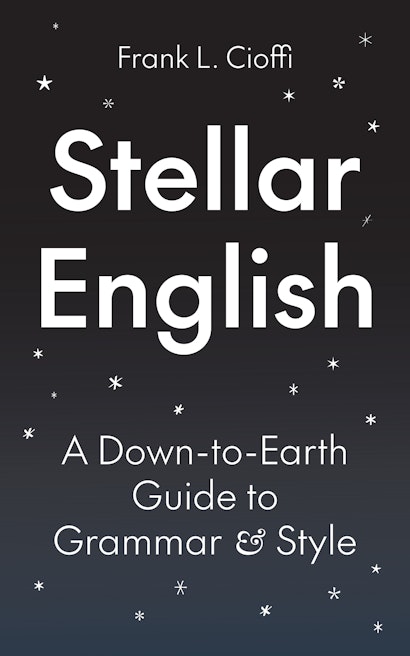Stellar English lays out the fundamentals of effective writing, from word choice and punctuation to parts of speech and common errors. Frank Cioffi emphasizes how formal written English—though only a subdialect of the language—enables writers to reach a wide and heterogenous audience.
Stellar English is a grammar handbook. There are a thousand or so such handbooks on the market, including your earlier PUP book, One Day in the Life of the English Language. Why did you want to write a second handbook—or for that matter, add to the large number available?
FLC: I’m just trying to write a good one, a really distinctive one. I proposed a revision of the earlier handbook, but my editor at PUP thought it would be best to start with a whole new concept.
And what is that concept?
FLC: I wanted to write a handbook that was more than merely a reference work—though I wanted it to be usable as a reference work too. But most of all, I was hoping to generate a grammar handbook that readers would feel compelled to read cover-to-cover. I wanted one that would be at once informative and entertaining.
What were the challenges of writing this book?
FLC: There were many. Perhaps the biggest challenge, though, was that I had to keep the book short (under 50,000 words) but also somewhat comprehensive. A genuinely comprehensive book, written by the linguists Geoffrey K. Pullum and Rodney Huddleston, is called The Cambridge Grammar of the English Language. It’s the gold standard. It’s twenty or thirty times the length of my book. I asked myself, how could I distill English grammar down to 5% the length of this comprehensive grammar? What was the ideal 5%? What do people really need to know as the very essentials of grammar?
I guess what might bother some people, though, is this: Is there any genuine or lasting value to learning “correct” English grammar? Most readers will understand what you mean despite the run-ons, fragments, or other fiddly bits that seem to matter so much to teachers and grammarians.
FLC: True enough. The trouble, though, if you use weak grammar, at least in some situations, something else in addition to your intended message, will be conveyed.
Which is—?
FLC: You will convey that you are perhaps not worth listening to—that your ideas are no better than your grammar.
I’m not sure. We’re in 2024, not 1954 or 1964, remember, and people use their cellphones all the time, which conveniently correct their English grammar. If they need to write something longer, they can use Chat-GPT or something similar. Many people have installed Grammarly on their laptops, so their sentences are automatically corrected as they type. A lot of people say that knowing grammar is about as valuable to the average person as knowing algebra—by which they mean that it’s an intellectual exercise learned in school but one with no lasting value or impact on their lives. Any truth to this?
FLC: My take in the book is that you need to master multiple dialects of English, one of which is “Standard Written English” or SWE. It will serve you in good stead in many situations—writing a report, a letter to the editor, an appeal to a company trying to rip you off, a job application, a paper in college. Knowledge of this dialect is very valuable; it gives you power. Why reject power?
And hey, I use algebra all the time. Most people do, but they don’t realize it. For example, a hitter in a baseball game comes to the plate and the announcer says, “This batter is 4 for 27 so far.” We use algebra to swiftly calculate 4/27= x/100. Let’s solve for X, then: it’s 400/27 or .145: He’s having a rough season.
Well, OK, but back to English. Ultimately, isn’t “standard written English” just one of the power tools of the ruling class?
FLC: Some people label it as such, I realize, and many of them are college professors. I think they are doing their students a disservice. Of course, believing this gets them out of having to teach a difficult, complex subject! On some level it’s mere rationalization. But the bottom line is that if you can’t employ this grammar in certain situations, you have a handicap of sorts. Using nonstandard written English often stigmatizes the writer or speaker. In addition, such grammar often results in distorting or burying one’s message—again, in certain situations and for some audiences.
I want to emphasize, though, that SWE is no better than other dialects. Sometimes, it’s appropriate and effective. It’s often the go-to grammar when, for example, you don’t know your audience or when the one thing you do know about them is that they expect “formality.” But sometimes the best dialect to use differs significantly from SWE, in which case using SWE might be stigmatizing! There are hundreds of English dialects worldwide, each with its own grammar, vocabulary, and pronunciation.
Tell me about what you call the “Seven C’s.”
FLC: The Seven C’s include credibility, communicativeness, clarity, confidence, comprehensibility, complexity, and consequentiality. The idea is this: if you use English in certain ways, you will gain facility in all of these areas. You will be communicative, complex yet clear, and the like; quite possibly your words will end up being heard and understood in more or less the way you intended. I argue that these are some of the benefits of mastering formal English.
The example sentences you use all connect to tell a story—a science fiction novel, in fact. How did you come up with that idea? Is this book a grammar guide or a novel? Can it succeed at being both?
FLC: I don’t know how I came up with the idea. I could have made the sentences connect up to create a detective novel, a romance novel, a spy novel, whatever. One of my friends, who holds dozens of patents, told me I should patent the idea of using example sentences in a grammar book to tell a story. Maybe I will.
I’m not a novelist, though maybe writing this book will get me a Hugo nomination—one for best science fiction novel that’s also a grammar handbook!
Wait. You’ve said you’re not a linguist and also not a novelist. But what you have written in Stellar English is basically a linguistics book, complete with charts and tables—and at the same time, it’s a novel. Do you feel qualified to have done that?
FLC: Nope, not qualified at all. But I’ll tell you something else I’m not.
What’s that?
FLC: I’m not a Chatbot.
Funny. But OK, let’s “drill down,” as they say. Outside of the few formal situations you mention where good grammar makes a difference, why does the average person really need to master SWE?
FLC: But you’re right: we are facing the increased diminution of the need to generate correct formal English. In my college, for example, we are having a faculty research symposium, but instead of presenting scholarly papers, everyone is required to use a “Pecha-Kucha” format: they present twenty slides, taking twenty seconds to explain/discuss each slide. Think of that: it takes me maybe a hundred hours to write a scholarly paper, but in this format I have only 400 seconds (six minutes, 40 seconds) to present it.
It reminds me of a scene in The Futurological Congress, a novel by Stanislaw Lem. At a scholarly conference, the participants are given a numbered list of common academic sentences on the topic (namely, the future). The list allows them to give four-minute-long presentations: “4, 6, 11, and therefore 22; 5, 9, hence 22; 3, 7, 2, 11, from which it followed that 22 and only 22! Someone jumped up, saying yes but 5, and what about 6, 18, or 4 for that matter; [then] a crushing retort that either way, 22.”[1]
What is 22?
FLC: 22 means the end of the world.
OK. What is your next book going to be?
FLC: A novel called Siliconsciousness. It depicts a world in which A.I. has run amok. No aliens, but it’s basically set in the same universe as Stellar English.
Nail-mons, master computer, that sort of thing? Cool. When will it come out, then?
FLC: Sometime never. It’s been rejected now about 300 times.
So what are you doing with it?
FLC: Perseverance is the key. I’m trying to make it better. I figure that even if it doesn’t get published, I have the responsibility of making it the very best novel I can. It will be seen as something of value, let’s say, if it’s discovered and published five hundred years after my death.
I have to say that that seems extremely unlikely.
FLC: Why do you say that?
Oh, 22!
Frank L. Cioffi is professor of English at Baruch College, City University of New York. He has taught writing and literature at Indiana University, Eastern New Mexico University, Central Washington University, Scripps College, Princeton University, and the University of Gdańsk in Poland. His books include The Imaginative Argument: A Practical Manifesto for Writers and One Day in the Life of the English Language: A Microcosmic Usage Handbook (both Princeton).
Notes
[1] Lem, Stanislaw. The Futurological Congress. Translated by Michael Kandel, Avon Books, 1974, p. 25.

